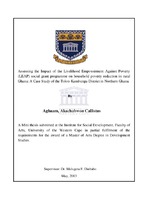| dc.description.abstract | Over the last decade, there has been a marked convergence in thinking regarding the importance of social cash transfers in poverty alleviation. As such, most governments especially in the developing world have began embracing the idea of rolling out various social cash transfers programmes in a bid to address poverty, social exclusion and vulnerability. This study which is predominantly centred on the LEAP social grant programme in Ghana aims at assessing the impact of the programme in alleviating household poverty in rural Ghana, specifically in the Tolon-Kumbungu district of the Northern region. Through a combination of both qualitative and quantitative strategies, the study focuses on unravelling
in how far the programme has contributed to improving the livelihoods and general welfare of beneficiary households in the case study area. Using data from structured household questionnaires, focus group discussions and in-depth
interviews conducted in two rural communities (Dingoni and Woribogu), the study
establishes that the LEAP social grant has a significant positive impact on food consumption, frequency of utilization of healthcare facilities and the school enrolment rate for children aged 6-13 years in beneficiary households. However, although hypothesised, no significant impact is observed in relation to the incidence of child labour in the household. Thus, in line with Rawls’ theory of justice, the researcher argues that the LEAP social grant programme is a very useful mechanism for promoting social justice in the Ghanaian society. Despite its successes, the study also uncovers that, the insufficient nature of the cash transfer,
irregular payment periods, lack of access to complimentary services and lack of transparency and accountability on the part of payment officials are some key challenges confronting the programme from the perspective of beneficiaries, whilst limited staff capacity, the non availability of training opportunities for staff, inadequate logistical support and no motivation for programme staff and voluntary structures also constitute some key challenges from the institutional perspective. In all, the study recommends that government increases the cash amount and pay transfers regularly, link beneficiaries to existing complimentary services in the district, recruit more staff and provide in-service training opportunities for them, strictly monitor compliance to LEAP conditionalities and ensure transparency and accountability in the payment of
transfers to beneficiaries. | en_US |

